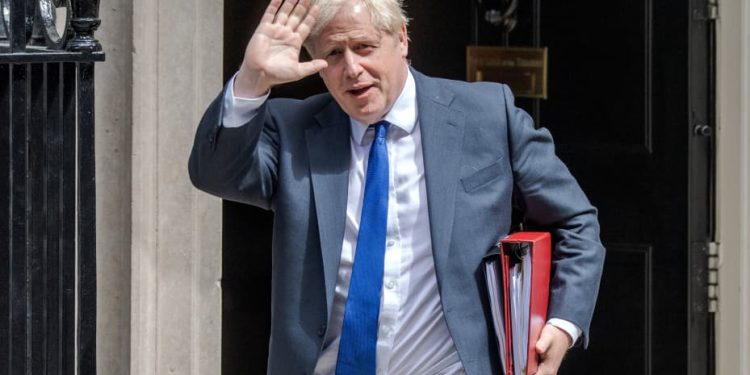- Boris Johnson agrees to resign as prime minister, according to reports
- Decision came after PM was abandoned by newly-appointed ministers following the resignations of more than 50 others
- The prime minister had pledged to push through the open rebellion
- Johnson may stay on as prime minister until a new Conservative Party leader is elected
The article was last updated at 0844 UTC/GMT
British media: Johnson agrees to step down
British Prime Minister Boris Johnson has agreed to resign as leader of the Conservative Party, British broadcasters BBC and Sky reported on Thursday.
The reports follow a slew of scandals that surrounded him and his government, and reports that Michael Gove, one of the most senior ministers in the British government, told Johnson he must go.
Johnson had initially refused to resign, despite a succession of resignations, as he faced a grilling from UK lawmakers in parliament on Wednesday. His grip on power was weakened considerably, however, when Rishi Sunak quit as finance minister and Sajid Javid resigned as health secretary within minutes of one another on Tuesday evening.
More ministers resigned their posts on Wednesday and Thursday, bringing the total to more than 50 in less than 48 hours.
The resignations follow shifting explanations from Johnson’s Downing Street office about a sex scandal that involved a mid-ranking ally of the prime minister.
Johnson has faced sharp criticism over his promotion of junior minister Chris Pincher to the role of chief whip — a key position that involves enforcing party discipline. The promotion came despite Pincher being accused of drunkenly groping two men, and Johnson having been made aware of the allegations.
Cabinet member Nadhim Zahawi on Thursday said Johnson must quit despite being appointed by the prime minister as the UK’s finance minister only 36 hours earlier.
He replaced Rishi Sunak as Chancellor of the Exchequer on Tuesday evening.
Moments after Zahawi’s intervention, the education minister Johnson appointed at the same time, Michelle Donelan, announced her resignation.
Earlier, Northern Ireland Secretary became the first Cabinet minister of the day to quit, saying the situation was “past the point of no return.” That resignation was followed by the departure of a succession of junior ministers.
What’s behind the ministerial resignations?
Ministers of Johnson’s Cabinet resigned shortly after he appeared on television to apologize for appointing Pincher to the role despite knowing the allegations.
Johnson is alleged to have joked about the claims, referring to the lawmaker as “Pincher by name, pincher by nature” in 2020.
The prime minister’s office had initially said that it was not aware of any complaints against Pincher, but later changed this to “serious specific complaints.”
This account was refuted by the top civil servant in the UK Foreign Office from 2015 to 2020, who said the complaints about Pincher had been upheld. In a highly unusual move for a civil servant, Simon McDonald publicly claimed that Johnson’s office had repeatedly failed to tell the truth.
The revelations are only the latest in a string of scandals involving Johnson, who was been fined by police for lockdown-breaching parties. Last month, he survived a no-confidence vote that saw 41% of Conservative lawmakers vote to topple him.










Discussion about this post